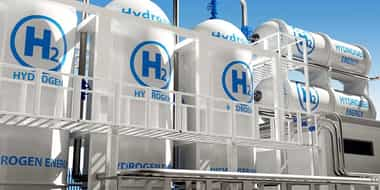
May 14, 2025
Blog Energy & Sustainability Analyzing the Innovation Trends in Hydrogen Energy Storage
Hydrogen technology is widely used across industries like glass, fertilizer, metal refining, and chemical manufacturing, driven by the need to reduce carbon footprints due to environmental regulations and shifting customer preferences.
The growth of hydrogen storage systems is being fueled by the rapid industrialization in developing nations and the growing adoption of alternative energy sources. A key government focus is on establishing cost-efficient, energy-saving hydrogen plants to support national development.
The Global Hydrogen Energy Storage Market was valued at $ 1.0 billion in 2023 and is projected to reach $23.7 billion by the end of 2029 with a CAGR of 72.1% from 2024 to 2029.
Hydrogen enhances the integration of renewable energy by storing power from renewable energy sources (RES) and providing fuel for electricity generation, heating, or transportation
Stored hydrogen can be used to produce electricity or serve energy-intensive sectors like gas grids, transportation, and industrial applications. Its storage capabilities are not region-specific, allowing renewable energy to be transferred to various sectors requiring high energy consumption.
The high capital cost of hydrogen energy storage is a significant challenge, as it is more expensive than fossil fuels. Many hydrogen storage technologies are still in the early stages, and the energy produced by fuel cells from hydrogen is often insufficient to meet the needs of commercial and residential buildings. Storing hydrogen in liquid form incurs high costs due to the necessary insulation to prevent vaporization, making charging, discharging, and overall process expenses quite substantial.
Additionally, stringent government regulations on hydrogen production via electrolysis are slowing the growth of the global hydrogen energy storage market. In certain regions, the manufacturing and use of hydrogen are restricted, with safety concerns for workers involved in the production process further complicating the sector's expansion.
The global hydrogen energy storage (HES) market was valued at $ 1.0 billion in 2023 and is projected to reach $23.7 billion by the end of 2029 with a CAGR of of 72.1% from 2024 to 2029.
Their electrolyzers are powered by renewable energy and utilize advanced PEM technology to create the purest green hydrogen available. The company views this approach as the most effective way to support global decarbonization and achieve net-zero emissions.
ITM Power's product range includes the HGAS1SP (the smallest containerized PEM electrolyzer), HGAS3SP (a medium-sized containerized PEM electrolyzer), the 3MEP CUBE (designed for large-scale hydrogen production), and the 2 GEP Skid (with a 5 MW capacity), among others.
A key challenge in hydrogen production is CO2 capture during the steam methane reforming process, for which Air Liquide has developed a unique solution: CryocapTM. This innovation allows for large-scale carbon capture, storage, and reuse across various industrial applications.
Cummins' HySTAT™ and HyLYZER™ on-site hydrogen generators reflect years of continuous improvement in performance, flexibility, quality, and durability. Their advanced modular electrolyzers provide high-purity hydrogen with secure, easy operations, low maintenance, and global support from installation to startup.
This innovative technology allows for efficient hydrogen storage in a compact, low-pressure form, enhancing safety and reducing space requirements compared to traditional high-pressure storage methods.
GKN Hydrogen offers scalable storage solutions, such as the 250kg H2 storage units, along with fully integrated power-to-power systems that deliver up to 100kW of output with scalable MWh durations.
The company is involved in various projects dedicated to decarbonization, renewable energy, and sustainable mobility, supported by extensive R&D efforts and public-private partnerships across Spain and Europe.
ARIEMA's hydrogen initiatives include developing metal hydride storage systems, a portable hydrogen refueling station for UAVs, and studying the feasibility of seawater electrolysis. Its product portfolio includes advanced electrolyzers for hydrogen production, fuel cells, PEMs (Proton Exchange Membrane), and other solutions for hydrogen production, transport, storage, and utilization.
Hydrogen energy storage is rapidly advancing as a clean, scalable solution to support industrial growth and renewable integration. With strong market projections and continuous innovation, it holds great promise despite current cost and regulatory challenges.
Consider becoming a member of the BCC Research library and gain access to our full catalog of market research reports in your industry. Not seeing what you are looking for? We offer custom solutions too, including our new product line: Custom Intelligence Services.
Contact us today to find out more.

Divya Dhamija is a Senior Executive of Marketing Operations at BCC Research, with a master’s degree in business. She specializes in optimizing marketing strategies and content creation and is dedicated to driving organizational growth through strategic marketing initiatives.

Electrical switches—devices that control the flow of electricity—are the backbon...

As the world accelerates toward net-zero emissions, hydrogen, and ammonia have e...

The cold chain market in the Middle East and North Africa (MENA) is experiencing...

We are your trusted research partner, providing actionable insights and custom consulting across life sciences, advanced materials, and technology. Allow BCC Research to nurture your smartest business decisions today, tomorrow, and beyond.
Contact UsBCC Research provides objective, unbiased measurement and assessment of market opportunities with detailed market research reports. Our experienced industry analysts assess growth opportunities, market sizing, technologies, applications, supply chains and companies with the singular goal of helping you make informed business decisions, free of noise and hype.